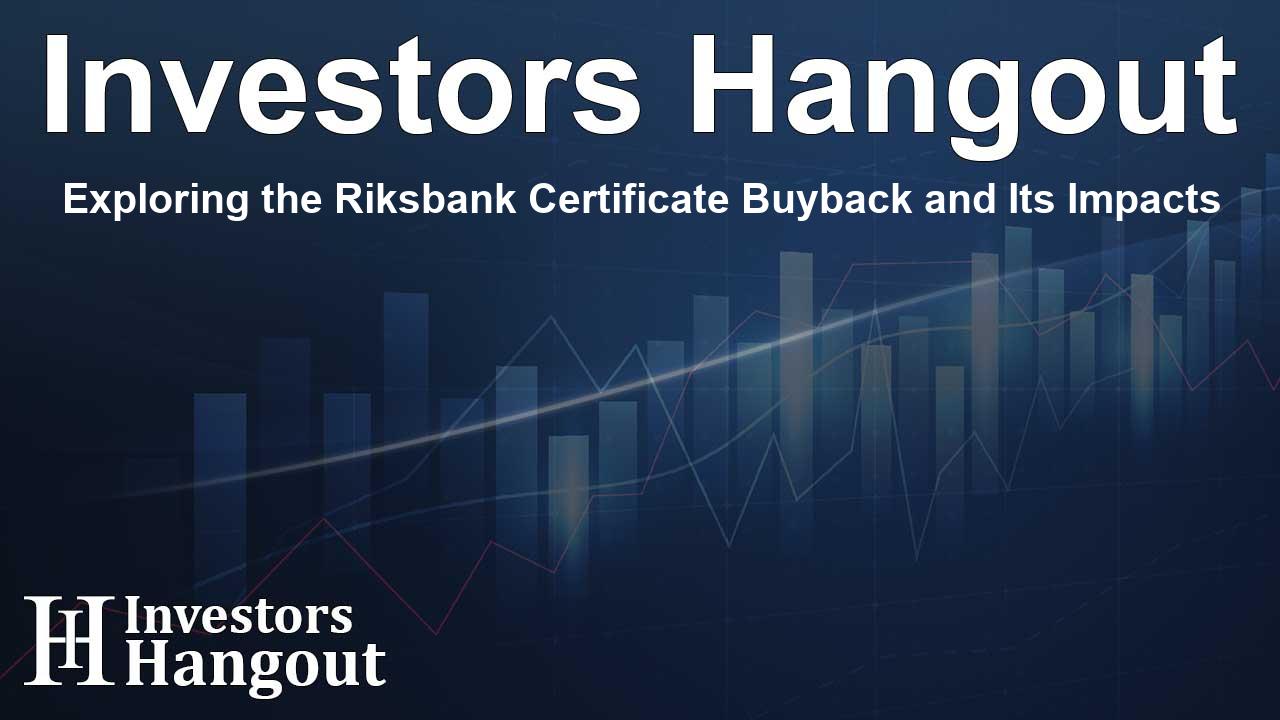Exploring the Riksbank Certificate Buyback and Its Impacts

Understanding Riksbank Certificates and Their Significance
Riksbank certificates play a crucial role in the financial landscape, acting as an instrument for the central bank to manage liquidity in the market. These certificates are short-term debt securities issued by the Riksbank, Sweden's central bank, enabling it to control money supply and influence interest rates. The recent buyback of Riksbank certificates highlights their importance in liquidity management, particularly in times of financial uncertainty.
Details of the Buyback Transaction
The recent buyback initiative involved a total volume of 12.50 billion units, showcasing the central bank's aggressive approach in positioning itself within the market. This tactical decision aims to adjust the fixed rate to 2.10%, which is slightly above the steering rate of the Riksbank, improving the effectiveness of monetary policy. Such moves are essential not only for stabilizing the financial environment but also for instilling confidence among investors.
Certificate Maturity and Trade Details
The certificates have a maturity date that plays a pivotal role in investment decisions. In this case, the maturity was set for a specific future date. Key dates related to the transaction included the trade day and the settlement day, strategically chosen to facilitate smooth market operations. These factors need to be communicated effectively to ensure transparency in the buyback process.
The Impact of Buybacks on Market Conditions
Buybacks such as this can significantly impact market conditions, including liquidity and interest rates. By conducting a buyback, the Riksbank actively removes excess supply from the market, which can lead to an increase in prices, consequently affecting yields. Such decisions are often closely monitored by investors as they can signal the central bank's future monetary policy direction.
Why Investors Care About Buybacks
For investors, the Riksbank's approach to managing its certificates can influence their portfolio strategies. A buyback can enhance the value of existing securities, offering an opportunity for profit when market conditions are favorable. Investors often look for signs of the central bank's future actions, seeking to align their strategies with expected market movements.
Challenges and Considerations in the Buyback Process
While buybacks offer several advantages, they also come with inherent challenges. One of the primary concerns is ensuring that the liquidity levels remain adequate following the buyback. Additionally, market participants must perceive the buyback as a signal of confidence from the central bank. If misinterpreted, it could lead to market volatility.
Conclusion: The Future of Riksbank Certificates
The recent buyback of Riksbank certificates emphasizes the central bank's commitment to maintaining stability in the financial system. Investors must remain vigilant, monitoring the effects of such buybacks on market dynamics. Moving forward, the implications of this buyback could lead to either adopted strategies by corporate entities or shifts in investment patterns across various sectors. The strategic adjustments made by the Riksbank will undoubtedly shape the future of monetary policy and its influence on the economy.
Frequently Asked Questions
What are Riksbank certificates?
Riksbank certificates are short-term debt instruments issued by the central bank of Sweden, used to manage liquidity and control money supply.
Why did the Riksbank conduct a buyback?
The buyback was conducted to manage liquidity more effectively and to adjust the fixed rate to better align with monetary policy goals.
How does a buyback affect the market?
A buyback generally reduces the supply of securities in the market, which can increase prices and affect yields positively.
What was the volume of the recent buyback?
The recent buyback involved a volume of 12.50 billion units of Riksbank certificates.
What should investors watch for after the buyback?
Investors should monitor liquidity levels, market reactions to the buyback, and any signals from the Riksbank regarding future monetary policy adjustments.
About The Author
Contact Addison Perry privately here. Or send an email with ATTN: Addison Perry as the subject to contact@investorshangout.com.
About Investors Hangout
Investors Hangout is a leading online stock forum for financial discussion and learning, offering a wide range of free tools and resources. It draws in traders of all levels, who exchange market knowledge, investigate trading tactics, and keep an eye on industry developments in real time. Featuring financial articles, stock message boards, quotes, charts, company profiles, and live news updates. Through cooperative learning and a wealth of informational resources, it helps users from novices creating their first portfolios to experts honing their techniques. Join Investors Hangout today: https://investorshangout.com/
The content of this article is based on factual, publicly available information and does not represent legal, financial, or investment advice. Investors Hangout does not offer financial advice, and the author is not a licensed financial advisor. Consult a qualified advisor before making any financial or investment decisions based on this article. This article should not be considered advice to purchase, sell, or hold any securities or other investments. If any of the material provided here is inaccurate, please contact us for corrections.
